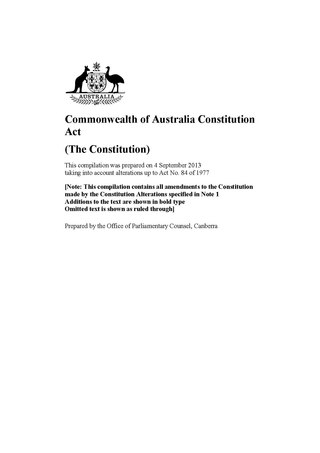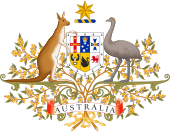
The treasurerof Australia, also known as the Federaltreasurer or simply the treasurer, is the minister of state of the Commonwealth of Australia charged with overseeing government revenue collection, federal expenditure and economic policy as the head of the Department of the Treasury. The current treasurer is Jim Chalmers, who was appointed by Prime Minister Anthony Albanese in May 2022 following the 2022 Australian federal election.
An accredited or sophisticated investor is an investor with a special status under financial regulation laws. The definition of an accredited investor, and the consequences of being classified as such, vary between countries. Generally, accredited investors include high-net-worth individuals, banks, financial institutions, and other large corporations, who have access to complex and higher-risk investments such as venture capital, hedge funds, and angel investments.

Corporate law is the body of law governing the rights, relations, and conduct of persons, companies, organizations and businesses. The term refers to the legal practice of law relating to corporations, or to the theory of corporations. Corporate law often describes the law relating to matters which derive directly from the life-cycle of a corporation. It thus encompasses the formation, funding, governance, and death of a corporation.
The Australian Securities and Investments Commission (ASIC) is an independent commission of the Australian Government tasked as the national corporate regulator. ASIC's role is to regulate company and financial services and enforce laws to protect Australian consumers, investors and creditors. ASIC was established on 1 July 1998 following recommendations from the Wallis Inquiry. ASIC's authority and scope are determined by the Australian Securities and Investments Commission Act 2001.
The Australian financial system consists of the arrangements covering the borrowing and lending of funds and the transfer of ownership of financial claims in Australia, comprising:
Banking in Australia is dominated by four major banks: Commonwealth Bank, Westpac, Australia & New Zealand Banking Group and National Australia Bank. There are several smaller banks with a presence throughout the country which includes Bendigo and Adelaide Bank, Suncorp Bank, and a large number of other financial institutions, such as credit unions, building societies and mutual banks, which provide limited banking-type services and are described as authorised deposit-taking institutions (ADIs). Many large foreign banks have a presence, but few have a retail banking presence. The central bank is the Reserve Bank of Australia (RBA). The Australian government’s Financial Claims Scheme guarantees deposits up to $250,000 per account-holder per ADI in the event of the ADI failing.
Corporate Law Economic Reform Program Act 2004, commonly called CLERP 9, modified the Corporations Act 2001 (Commonwealth) which governs corporate law in Australia. It was enacted in July 2004.

Securities regulation in the United States is the field of U.S. law that covers transactions and other dealings with securities. The term is usually understood to include both federal and state-level regulation by governmental regulatory agencies, but sometimes may also encompass listing requirements of exchanges like the New York Stock Exchange and rules of self-regulatory organizations like the Financial Industry Regulatory Authority (FINRA).
Section 51(xxxvii) of the Constitution of Australia is a provision in the Australian Constitution which empowers the Australian Parliament to legislate on matters referred to it by any state. As Australia is a federation, both states and the Commonwealth have legislative power, and the Australian Constitution limits Commonwealth power. Section 51(xxxvii) allows for a degree of flexibility in the allocation of legislative powers.

New South Wales v The Commonwealth, the Incorporation Case, was a decision handed down in the High Court of Australia on 8 February 1990 concerning the corporations power in s51(xx) of the Commonwealth Constitution. The states of New South Wales, South Australia and Western Australia brought an application seeking a declaration as to the validity of certain aspects of the Corporations Act 1989 (Cth).
A responsible entity is a peculiarly Australian invention designed to replace the manager/trustee in managed investment schemes. It was created by the Managed Investments Act 1998, which made significant amendments to the prescribed interest provisions contained in the Australian Corporations Act.
Australian insurance law is based on commercial contract law, but is subject to regulations that affect the insurance industry and insurance contracts within Australia. Commonwealth Parliament has power to make laws with respect to insurance and insurance companies under section 51(xiv) and (xx) of the Australian Constitution. Generally, the Insurance Act 1973 and Insurance Contracts Act 1984 are the main acts that apply, however there are a number of other pieces of legislation enacted by the states, private codes and voluminous case law all of which forms the body of insurance law.
Australia's insurance market can be divided into roughly three components: life insurance, general insurance and health insurance. These markets are fairly distinct, with most larger insurers focusing on only one type, although in recent times several of these companies have broadened their scope into more general financial services, and have faced competition from banks and subsidiaries of foreign financial conglomerates. With services such as disability insurance, income protection and even funeral insurance, these insurance giants are stepping in to fill the gap where people may have otherwise been in need of a personal or signature loan from their financial institution.

Australian corporations law has historically borrowed heavily from UK company law. Its legal structure now consists of a single, national statute, the Corporations Act 2001. The statute is administered by a single national regulatory authority, the Australian Securities & Investments Commission (ASIC).

Australian Financial Services Licence (AFSL) is a legal licence provided by the Australian Securities and Investments Commission (ASIC) enabling the operation and activities of Australian financial services businesses. It is a legal requirement for any Australian financial service business to obtain an AFSL from the day business operations begin unless provided a limited licence or exemption with special provisions under section 911A(2)(l) of the Corporations Act. The AFSL is issued by ASIC under Chapter 7 of the Corporations Act 2001, in line with its regulatory supervision of the financial services industry. Australian Financial Service Businesses must submit an application to ASIC coupled with supporting documents to be assessed. Licensees are obligated to provide efficient, honest and fair financial services under the conditions of their AFSL and the Corporations Act 2001. Failure to follow and uphold the policies under the AFSL and the Corporations Act 2001 will result in penalties against the business.
Australian securities law relates to securities issued by corporations as well as other securities, including debentures, stocks and bonds issued by governments, and interests in managed investment schemes.

Storm Financial Limited was a financial advice company, based in Townsville, Queensland, Australia. The company was founded by Emmanuel Cassimatis and his wife Julie Cassimatis as a private company initially with the name Cassimatis Securities Pty Ltd on 23 May 1994. As part of the company's expansion outside of Townsville the company changed its name from a personality based name to ozdaq Securities Pty Ltd on 10 April 2000. This name remained intact until 1 February 2004 when it was relinquished consequent to trademark objections from the Nasdaq stock exchange in the United States. The company then traded as Storm Financial Pty Ltd from 2 February 2004 until 14 June 2007 at which time the company became an unlisted public company and continued trading as Storm Financial Ltd from 15 June 2007 in preparation for making an initial public offering (IPO) in December 2007. This IPO was subject to a Storm Financial Prospectus which was dated 14 November 2007 and lodged with the Australian Securities & Investments Commission (ASIC) on the same date. Storm Financial Ltd continued to trade until external administrator Worrells Solvency and Forensic Accountants were appointed on 9 January 2009. The main creditor Commonwealth Bank appointed receivers and manager KordaMentha on 15 January 2009.
Financial regulation in Australia is extensive and detailed.

The British Virgin Islands company law is the law that governs businesses registered in the British Virgin Islands. It is primarily codified through the BVI Business Companies Act, 2004, and to a lesser extent by the Insolvency Act, 2003 and by the Securities and Investment Business Act, 2010. The British Virgin Islands has approximately 30 registered companies per head of population, which is likely the highest ratio of any country in the world. Annual company registration fees provide a significant part of Government revenue in the British Virgin Islands, which accounts for the comparative lack of other taxation. This might explain why company law forms a much more prominent part of the law of the British Virgin Islands when compared to countries of similar size.
In Australia, charitable investment fundraisers (CIF) are not-for-profit entities with charitable purposes that take deposits from the public to finance those charitable purposes. CIFs may apply for an exemption from the requirement to hold an Australian Financial Services Licence (AFSL) if the “financial products” they provide is limited to the issue of debentures or the running of managed investment schemes. For example, the solicitation of secured loans that are paid back with interest are considered debentures. Such deposit taking entities have since 2003 also been exempted from certain requirements of the Banking Act 1959.








